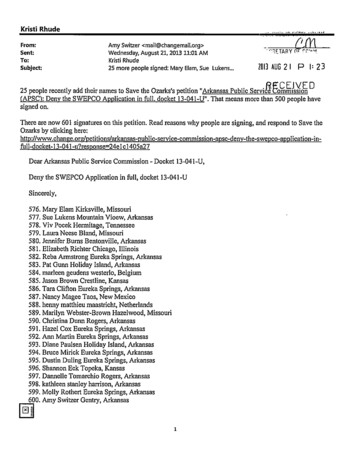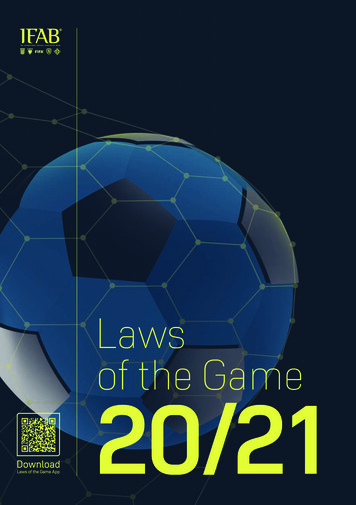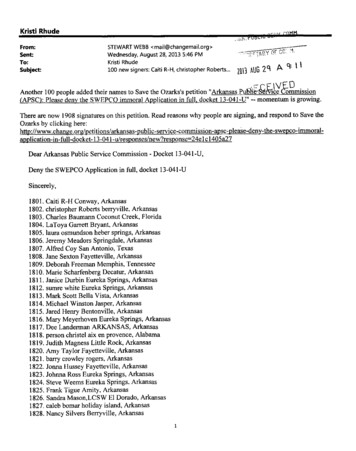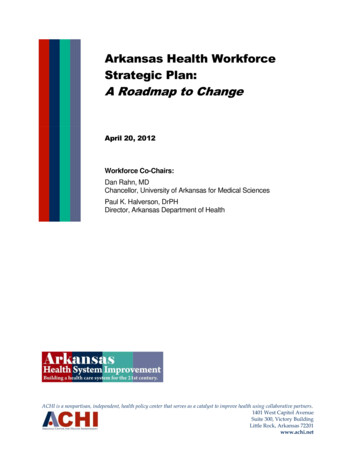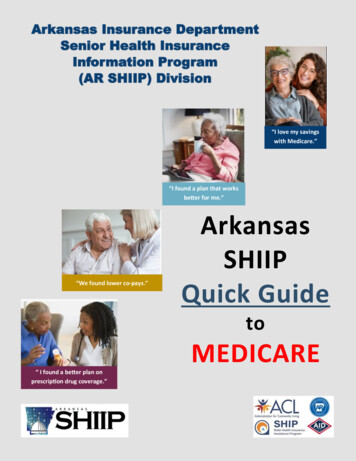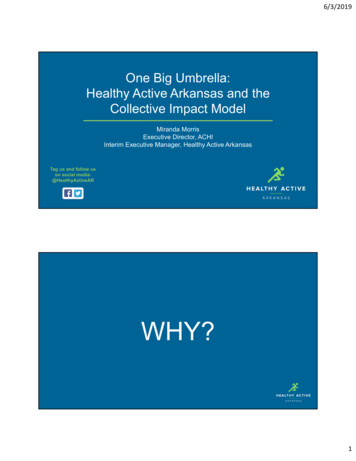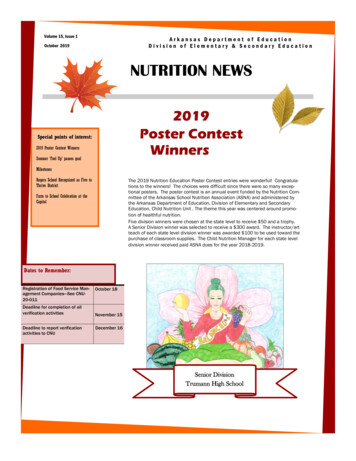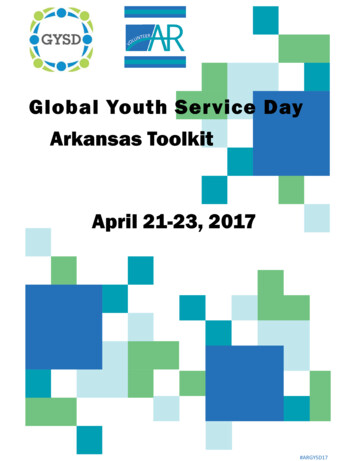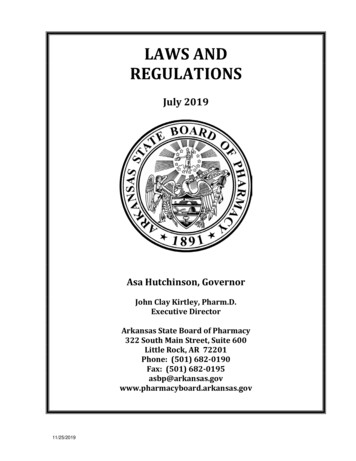
Transcription
LAWS ANDREGULATIONSJuly 2019Asa Hutchinson, GovernorJohn Clay Kirtley, Pharm.D.Executive DirectorArkansas State Board of Pharmacy322 South Main Street, Suite 600Little Rock, AR 72201Phone: (501) 682-0190Fax: (501) s.gov11/25/2019
Arkansas State Board of Pharmacy Members:Deborah Mack, P.D.President, BentonvilleLenora Newsome, P.D.Vice President/Secretary, SmackoverSteve Bryant, P.D.Member, BatesvilleRebecca Mitchell, Pharm.D.Member, GreenbrierLynn Crouse, Pharm.D.Member, Lake VillageBrian Jolly, Pharm.D.Member, BeebeCarol Rader, RNPublic Member, Fort SmithAmy Fore, MHSA, FACMPE, FACHEPublic Member, Fort Smith11/25/2019
Board of Pharmacy Law Book - ActsTable of ContentsPharmacy Practice -40117-92-40217-92-40317-92-404Definitions Exemptions .Pharmacy laws unaffected .Privilege tax unaffected .Prohibited acts – Penalties .Injunctions Prosecutions – Disposition of fines .Fees .Prescriptions for optometrists .Prescriptive authority of advance practice nurses Construction of Acts 1997, No. 1204 .Prescriptions for physician assistants .Members – Qualifications Members – Oath Members – Compensation .Organization and proceedings .Rules and regulations – Enforcement .Issuance of bulletins – Annual Reports .Maintenance of office .Employees Medications Administration Advisory Committee .License Required .Unlicensed practice – Penalty .Unlawful use of professional title – Penalty Board administration – Support services .Application – Qualification of applicants Examinations Internship required .Reciprocity .Registration and certificate .Failure to renew .Revocation, suspension, or non-renewal – Grounds Revocation and fine – Adulteration of drugs .Revocation – Procedure .Revocation – Appeals .Alternative penalties Credential required for professional pharmacy service .Criminal Background Checks .Applicability to out-of-state operations .Licensed pharmacist required .Licensed pharmacist required – Exceptions Pharmacy permit required -2424-252525-2727i
macy permit – Application .Revocation – Grounds .Revocation – Procedure .Pharmacy library required Records of poison sales Prescription contents and labels .Nursing home consultant permit .Penalty .Rules and regulations .Generic substitutions Labeling Price Lists .Short title .Definitions Advisory Committee for Hospital Pharmacies Regulatory authority Hospital pharmacy license – Services permitted .Hospital pharmaceutical permit .Unlawful for hospital to hold licensed pharmacy permit –Exemptions .Definitions Administration .Functions .Board review Notification of procedures, rights, and responsibilities – Failureto comply .Funding Liability Powers and duties of Arkansas State Board of Pharmacy .Definitions License required .Exemption from license and permit requirements .Supply order required .Labeling Regulations .Manufacture, shipment, or sale of medical gases Revocation or suspension of license Advisory committee to the board .Title .Purpose .Definitions Requirements for Internet sales Requirements for Internet sites Disclaimers or limitations of liabilities Enforcement 4040-4141414141-434343-444444
Miscellaneous Statutes Related tration, certification, and licensing for criminaloffenders .Subpoena power of boards – Enforcement .Immunity of board members Continuing education requirements .B11-222-3iii
Uniform Controlled Substances 25-64-1003ivDefinitions Director’s duties .Nomenclature .Criteria for Schedule I .Criteria for Schedule II .Criteria for Schedule III .Criteria for Schedule IV .Criteria for Schedule V Schedule VI established .Criteria for Schedule VI .Substances in Schedule VI .Schedule revisions Order forms .Written prescriptions Exemptions .Suspicious order reports .Possession – Penalty Possession with intent to manufacture – Unlawfuldistribution Retail sales limit .C1-66-7777788888-99999-1010-111111-1212-14
Insurance Policies – PrescriptionDrug 23-79-60423-79-60523-79-60623-79-607Prescription drug benefits Definitions Diabetes self-management training – Licensed providers –Prescription by physician .Requirements Exclusions Regulations .Applicability – Delivery within state .Applicability – Exceptions .3333-44v
Food, Drug, and Cosmetic 220-56-223viTitle .Definitions Applicability .Notice of minor violations Penalties – Exceptions .Duty of prosecuting attorney Injunction authorized Adulterated food .Misbranded food .Adulterated drug or device .Misbranded drug or device .Adulterated cosmetic Misbranded cosmetic False or misleading advertisement .Prohibited acts .Adulterated, misbranded, or abandoned food, drug, device, orcosmetic – Procedures .Contamination with microorganisms .Poisonous or deleterious substance – Regulation for use .State Board of Health – Authority to regulate .State Board of Health – Inspection .State Board of Health – Publication and dissemination ofinformation .State Board of Health – Enforcement of subchapter State Board of Health – Enforcement of federal law 4-151515-16161616
Controlled Substances and 920-64-51020-64-51120-64-51220-64-513Applicability .Construction .Definitions Sales – Permit required .Wholesale distributor – Permit required .Wholesale distributors – Shipment to certain licensedprofessionals .Regulations .Revocation or suspension of licenses .Penalties Hearing procedures .Violations .Inspection of records Injunctive powers .444-55555vii
Administrative Procedures 15-21525-15-21625-15-217viiiTitle .Definitions Rules – Required rules – Public inspection .Rules – Procedure for adoption Rules – “The Arkansas Register” .Rules – Declaratory orders .Rules – Actions for declaratory judgments .Administrative adjudication – Procedures generally Administrative adjudication – Communication by decisionmaker Administrative adjudication – Decisions .Administrative adjudication – Licenses .Administrative adjudication – Judicial Review Hearings generally Failure of agency to act – Action by injured party .Model rules .Review of agency rules Alternative sanctions 6-778-99-101010-111111-12
Agency # 070.00Pharmacy Practice Act17-92-101. DefinitionsAs used in this chapter:(1)"Biological product" means a biological product as defined by 42 U.S.C. 262(i)(1), as existing on January 1,2019; and;(2)“Credentialing” means the issuance of or approval by the Arkansas State Board of Pharmacy of a credentialissued to a pharmacist by an agency approved by the board certifying that the pharmacist has met thestandards of competency established by the Arkansas State Board of Pharmacy for disease state managementor other pharmacy services necessitating a credential;(3)“Dentist” means a practitioner of dentistry duly licensed under the laws of this or some other state;(4)(A) “Disease state management” means a strategy that utilizes a team-oriented, multidisciplinary approach toimprove health care outcomes and quality of care, and when possible, to control health care cost throughmanagement of targeted chronic disease states.(B) Disease state management focuses on improving health care from prevention to diagnosis and treatment toongoing follow-up.(C) Disease state management will involve, but not be limited to, patient education, self-care techniques, andoutpatient drug therapy management pursuant to a patient care plan;(5)“Drug” shall include all medicines and preparations recognized in the United States Pharmacopoeia or theNational Formulary as substances intended to be used for the care, mitigation, or prevention of disease ofeither man or other animals;(6)“Generically equivalent” means a drug that is pharmaceutically and therapeutically equivalent to the drugprescribed;(7)"Interchangeable biological product" means a biological product that is interchangeable as defined by 42U.S.C. 262(i)(3), as existing on January 1, 2019.(8)(A) “Licensed pharmacist” means a person holding a license under the provisions of this chapter.(B) A “licensed pharmacist” shall be considered an individual healthcare provider;(9)“Medicine” means a drug or preparation of drugs in suitable form for use as a curative or remedial substance;(10) “Optometrist” means a practitioner of optometry duly licensed under the laws of this state;(11) “Patient care plan” means a written course of action that is patient- or physician- or pharmacist-specific anddisease-specific for helping a patient to achieve outcomes that improve a patient's quality of life;(12) “Pharmaceutically equivalent” means drug products that have identical amounts of the same active chemicalingredients in the same dosage form and that meet the identical, compendious, or other applicable standards ofstrength, quality, and purity according to the United States Pharmacopoeia or another nationally recognized1Arkansas State Board of Pharmacy Law BookPharmacy Practice Act July 2019A
compendium;(13) “Pharmacy” means the place licensed by the Arkansas State Board of Pharmacy in which drugs, chemicals,medicines, prescriptions, and poisons are compounded, dispensed, or sold at retail;(14) “Pharmacy care” means the process by which a pharmacist in consultation with the prescribing practitioneridentifies, resolves, and prevents potential and actual drug-related problems and optimizes patient therapyoutcomes through the responsible provision of drug therapy or disease state management for the purpose ofachieving any of the following definite outcomes that improve a patient's quality of life:(A)Cure of disease;(B)Elimination or reduction of a patient's symptomology;(C)Arresting or slowing a disease process; or(D)Preventing a disease or symptomology;(15) “Physician” means a practitioner of medicine duly licensed under the laws of this or some other state;(16) “Poisons” means any drug, chemical, medicine, or preparation liable to be destructive to adult human life inquantities of sixty (60) grains or less;(17)(A)“Practice of pharmacy” means the healthcare provider profession of:(i)(a)Dispensing, selling, distributing, transferring possession of, vending, bartering, or, inaccordance with rules adopted by the Arkansas State Board of Pharmacy, administeringdrugs, medicines, poisons, or chemicals that under the laws of the United States or the State ofArkansas may be sold or dispensed only on the prescription and order of a practitionerauthorized by law to prescribe drugs, medicines, poisons, or chemicals.(b)Except as limited by rules adopted by the Arkansas State Board of Pharmacy, a pharmacisthas the ability to administer medications.(c)Influenza vaccines and influenza immunizations may be administered to a person seven (7)years of age and older under a general written protocol.(d)Vaccines and immunizations other than influenza vaccines and influenza immunizations maybe administered to a person from seven (7) years of age to eighteen (18) years of age generalwritten protocol required under § 20-15-1203 if written consent of the parent or legal guardianof the minor is obtained before the administration of the vaccine or immunization.(e)Vaccines and immunizations other than influenza vaccines and influenza immunizations maybe administered to a person eighteen (18) years of age or older under a general writtenprotocol.(f)Medications other than vaccines and immunizations may be administered to a person seven(7) years of age or older under a patient-specific order or prescription and subject to reportingof the administration to the prescribing physician.(g)A general written protocol under subdivisions (16)(A)(i)(c) and (e) of this section and patientspecific orders or prescriptions under subdivisions (16)(A)(i)(d) and (f) shall be from a2Arkansas State Board of Pharmacy Law BookPharmacy Practice Act July 2019A
physician licensed by the Arkansas State Medical Board and practicing in Arkansas or withinfifty (50) miles of the Arkansas border;(h)Under a statewide protocol, a pharmacist may initiate therapy and administer or dispense, orboth, drugs that include Naloxone and nicotine replacement therapy products;(ii)Placing, packing, pouring, or putting into a container for dispensing, sale, distribution, transfer of,possession of, vending, or bartering any drug, medicine, poison, or chemical that under the laws ofthe United States or the State of Arkansas may be sold or dispensed only on the prescription of apractitioner authorized by law to prescribe drugs, medicines, poisons, or chemicals;(iii)Placing in or affixing upon any container described in subdivision (16)(A)(ii) of this section a labelrequired to be placed upon drugs, medicines, poisons, or chemicals sold or dispensed uponprescription of a practitioner authorized by law to prescribe those drugs, medicines, poisons, orchemicals;(iv)Preparing, typing, or writing labels to be placed in or affixed on any container described insubdivision (16)(A)(ii) of this section, which label is required to be placed upon drugs, medicines,poisons, or chemicals sold or dispensed upon prescription of a practitioner authorized by law toprescribe those drugs, medicines, poisons, or chemicals;(v)Interpreting prescriptions for drugs, medicines, poisons, or chemicals issued by practitionersauthorized by law to prescribe drugs, medicines, poisons, or chemicals that may be sold ordispensed only on prescription;(vi)Selecting, taking from, and replacing upon shelves in the prescription department of a pharmacy orapothecary drugs, medicines, chemicals, or poisons that are required by the laws of the UnitedStates or the State of Arkansas to be sold or dispensed only on prescription of a practitionerauthorized by law to prescribe them;(vii) Compounding, mixing, preparing, or combining drugs, medicines, chemicals, or poisons that underthe laws of the United States or the State of Arkansas may be sold or dispensed only on theprescription of a practitioner authorized by law to prescribe them;(viii) Advising and providing information concerning utilization of drugs and devices and participationin drug utilization reviews;(ix)(B)(a)Performing a specific act of drug therapy management or disease state management delegatedto a pharmacist for an individual patient based upon a written protocol or a patient care planapproved by a physician, who shall be licensed in this state under the Arkansas MedicalPractices Act, § 17-95-201 et seq., § 17-95-301 et seq., and § 17-95-401 et seq.(b)Drug therapy management shall not include the selection of drug products not prescribed bythe physician unless the drug products are either named in the physician-initiated protocol orthe physician-approved patient care plan;(x)Providing pharmacy care; and(xi)Providing pharmacokinetic services.The provisions of subdivisions (16)(A) and (16)(C) of this section shall not apply to employees ofwholesale drug companies or other drug distributors who do not fill prescriptions or sell or dispensedrugs to the consumer.3Arkansas State Board of Pharmacy Law BookPharmacy Practice Act July 2019A
(C)(i)The Arkansas State Board of Pharmacy may permit pharmacy technicians other than pharmacists orinterns to perform some or all of those functions described in board regulations under the direct,personal supervision of a licensed pharmacist pursuant to regulations defining the minimumqualifications of such employees, the ratio of pharmacy technicians to supervising pharmacists, andthe scope of the duties, practices, and procedures that the Arkansas State Board of Pharmacydetermines will promote the delivery of competent, professional pharmaceutical services andpromote the public health and welfare. Nothing in this chapter shall be construed as allowingpharmacy technicians to administer medications.(ii)The conduct of a pharmacy technician is the responsibility of the pharmacist-in-charge andsupervising pharmacist of the pharmacy who shall not permit the employee to perform any act,task, or function that involves the exercise of independent judgment by the employee.(iii)Pharmacy products prepared by pharmacy technicians shall be verified for accuracy by thesupervising pharmacist prior to release for patient use, and the verification shall be documented.(iv)The use of pharmacy technicians in a manner not authorized by this chapter or regulationspromulgated hereunder shall be unprofessional conduct by the pharmacist-in-charge and thesupervising pharmacist.(v)It is recognized that hospital pharmacy technicians as defined in § 17-92-602(5) are governed bythe Hospital Pharmacies Act, § 17-92-601 et seq., and related Arkansas State Board of Pharmacyregulations developed pursuant to that act;(18)(A) “Prescription” means an order for medicine or medicines usually written as a formula by a physician,optometrist, dentist, veterinarian, or other licensed medicinal practitioner. It contains the names andquantities of the desired substance, with instructions to the pharmacist for its preparation and to the patientfor the use of the medicine at a particular time and may authorize the pharmacist to substitute atherapeutically equivalent drug that is at a lower cost to the patient and communicate that authorization byany generally accepted means of communication of a prescription from a prescriber to a pharmacist.(B) A substitution of a therapeutically equivalent drug shall occur only after the prescriber grants suchauthorization for each prescription.(C)(i)Before dispensing, the pharmacist shall discuss verbally any suggested substitution with the patientand inform the patient that the patient has a right to refuse the substitution.(ii)The discussion under subdivision (17)(C)(i) of this section shall include without limitation:(a) Notification to the patient that the therapeutically equivalent drug does not contain theidentical active ingredient present in the prescribed drug; and(b) All differences in dosage and frequency between the prescribed drug and the therapeuticallyequivalent drug.(D) The pharmacist shall send notice of the substitution to the prescriber in writing or by electroniccommunication within twenty-four (24) hours after the drug is dispensed to the patient.(E) Subdivision (17)(B) of this section does not apply to specific acts of drug therapy management or diseasestate management delegated to a pharmacist based upon a written protocol or patient care plan approved4Arkansas State Board of Pharmacy Law BookPharmacy Practice Act July 2019A
by a physician under § 17-92-101(16)(A)(ix);(19) “Proprietary medicines”, when not otherwise limited, means remedies that a certain individual or individualshave the exclusive right to manufacture or sell;(20) “Supervision” means under the direct charge or direction of and does not contemplate any continued absenceof such supervision;(21) “Therapeutic class” means a group of similar drug products that have the same or similar mechanisms ofaction and are used to treat a specific condition;(22) “Therapeutically equivalent” means drug products from the same therapeutic class that if administered inappropriate amounts will provide the same therapeutic effect, identical in duration and intensity;(23) “Veterinarian” means a practitioner of veterinary medicine duly licensed under the laws of this or some otherstate; and(24) “Written protocol” means a physician's order, standing medical order, standing delegation order, or otherorder or protocol as defined by regulation of the Arkansas State Medical Board under the Arkansas MedicalPractices Act, § 17-95-201 et seq., § 17-95-301 et seq., and § 17-95-401 et seq.(25) “Statewide protocol” means a standardized procedure or protocol approved by the Arkansas State Board ofPharmacy and the Arkansas State Medical Board authorizing a pharmacist to initiate therapy and administeror dispense, or both, a drug or device.17-92-102. Exemptions(a)Nothing in this section and §§ 17-92-101(1)-(11), 17-92-103, 17-92-105, 17-92-205(b), 17-92-206(b), 17-92303, 17-92-402, 17-92-404, 17-92-405, 17-92-409, 17-92-410, and 17-92-411(a) shall prevent the personaladministration of drugs and medicines carried and kept for emergencies by licensed physicians, dentists, orveterinarians in order to supply the immediate needs of their patients while in their presence, nor shall it applyto physicians, dentists, or veterinarians compounding or dispensing their own prescriptions.(b)The provisions of this section and §§ 17-92-101(1)-(11), 17-92-103, 17-92-105, 17-92-205(b), 17-92-206(b),17-92-303, 17-92-402, 17-92-404, 17-92-405, 17-92-409, 17-92-410, and 17-92-411(a) shall not apply:(1)To the sale of drugs and medicines when intended for agricultural, technical, and industrial use, unlessthose drugs and medicines are legend drugs as defined in § 20-64-503;(2)To the sales by wholesale druggists, wholesale or retail grocers, or other wholesale or retail dealers ormanufacturers of proprietary medicines in original packages; or(3)To the sales of those drugs commonly known as “grocers' drugs” in original packages when put up underthe direction of a licensed pharmacist of this or some other state.(c)Further exempted from the provisions of this section and §§ 17-92-101(1)-(11), 17-92-103, 17-92-105, 17-92205(b), 17-92-206(b), 17-92-303, 17-92-402, 17-92-404, 17-92-405, 17-92-409, 17-92-410, and 17-92-411(a)are the sale of legend drugs approved by the State Board of Optometry by licensed pharmacists to dulylicensed optometrists and the possession and use of legend drugs by duly licensed optometrists as authorizedby the board and by §§ 17-90-401--17-90-403.(d)In the event a pharmacist receives a request for a prescription refill and the pharmacist is unable to obtainrefill authorization from the prescriber, the pharmacist may dispense a one-time emergency refill of theprescribed medication, provided that:5Arkansas State Board of Pharmacy Law BookPharmacy Practice Act July 2019A
(1)The prescription is not for a medicinal drug listed in Schedule II as defined in § 5-64-205;(2)The medication is essential to the maintenance of life or to the continuation of therapy;(3)In the pharmacist's professional judgment, the interruption of therapy might reasonably produceundesirable health consequences or may cause physical or mental discomfort;(4)The pharmacist properly records the dispensing; and(5)The dispensing pharmacist notifies the prescriber of the emergency dispensing within a reasonable timeafter the one-time emergency refill dispensing.17-92-103. Pharmacy lawsThis section and §§ 17-92-101(1)-(11), 17-92-102, 17-92-105, 17-92-205(b), 17-92-206(b), 17-92-303, 17-92-402,17-92-404, 17-92-405, 17-92-409, 17-92-410, and 17-92-411(a) shall not be construed to repeal any portion of thepharmacy laws in force prior to June 12, 1929, unless they are in direct conflict with these sections.17-92-104. Privilege taxesNothing in this act shall be construed to repeal or anywise interfere with the collection of the privilege taxes nowlevied, or that may be levied, for state, county, or city purposes on the business of hawking, peddling, or streetvending of goods, wares, and merchandise.17-92-105. Prohibited acts--Penalties(a) Violation of any part of this section and §§ 17-92-101(1)-(11), 17-92-102, 17-92-103, 17-92-205(b), 17-92206(b), 17-92-303, 17-92-402, 17-92-404, 17-92-405, 17-92-409, 17-92-410, and 17-92-411(a) not otherwiseprovided for shall be a violation and shall be punished by a fine of not less than twenty-five dollars ( 25.00) normore than three hundred dollars ( 300).(b) Each day of violation shall constitute a separate offense.17-92-106. Violations; writs of injunctionThe Arkansas State Board of Pharmacy, in its discretion and in addition to various remedies now provided by law,may apply to a court having competent jurisdiction over the parties and subject matter for a writ of injunction torestrain repetitious violations of the pharmacy laws of this state.17-92-107. Prosecutions- Disposition of fines.(a)(1)All suits for the collection of any fine or penalty prescribed in this act may be instituted in any courthaving jurisdiction thereof by any citizen of the county wherein the fine or penalty is incurred.(2)It shall be the duty of the prosecuting attorney of the county wherein the fine or penalty is incurred toprosecute all persons incurring them when notified by any citizen of the county.(1)Upon affidavit made before any justice of the peace by any citizen of the county showing a violation ofthis act, the justice of the peace shall issue his or her warrant as provided by law.(2)However, the Arkansas State Board of Pharmacy or any member thereof, or its authorized agent, mayinstitute and prosecute proceedings in any county in this state for violations of this act or for the(b)6Arkansas State Board of Pharmacy Law BookPharmacy Practice Act July 2019A
collection of any fine or penalty prescribed in this act in any court having jurisdiction.(c) All fines and penalties collected under the provisions of this act shall inure to the public school fund of theschool district in which the offense was committed.17-92-108. Fees(a)The fees charged by the Arkansas State Board of Pharmacy for the various examinations, permits, licenses,certificates, credentials, and books issued by the board shall be as follows:(1)The fee for examination for a license as a licensed pharmacist upon examination shall not exceedtwenty-five dollars ( 25.00) plus the actual cost of the examination;(2)The fee for a license as a licensed pharmacist from another state by reciprocity and without examinationshall not exceed two hundred dollars ( 200);(3)(A)The fee for the initial license as a licensed pharmacist shall not exceed seventy-five dollars( 75.00).(B)The fee for the renewal of a license as a licensed pharmacist shall not exceed seventy-five dollars( 75.00) per year;(4)(A)(i)The fee for issuance of a pharmacy p
Arkansas State Board of Pharmacy Law Book Pharmacy Practice Act July 2019 A Pharmacy Practice Act 17-92-101. Definitions As used in this chapter: (1) "Biological product" means a biological product as defined by 42 U.S.C. 262(i)(1), as existing on January 1, 2019; and;
